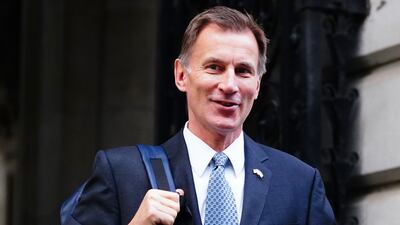UK Chancellor Jeremy Hunt will outline a plan to weather an economic “storm” when he unveils a £54 billion ($64bn) package of tax rises and spending cuts in Thursday's autumn statement.
Risking a backlash, Mr Hunt will insist to MPs that the plan puts the UK on a “balanced path to stability” as he tackles inflation, which has soared to a 41-year high.
“Difficult decisions” are necessary to keep mortgage rates low and deal with the rocketing energy and food prices, he will say, according to early-released excerpts of his speech to the House of Commons.
In the Government’s promotional video for the autumn statement, Prime Minister Rishi Sunak said: “Today’s statement will help deliver the long-term stability this country needs.”
But Conservatives on the right of the party are already voicing anger about the prospect of raising taxes, while energy bill support is likely to be reduced and public services face cuts.
Mr Hunt will insist his strategy “protects our long-term economic growth” while being “compassionate” to the most vulnerable in society.
“We aren’t immune to these global headwinds, but with this plan for stability, growth and public services, we will face into the storm,” he is expected to say.
Chancellor of the Exchequer Jeremy Hunt - in pictures
The long-awaited independent forecasts from the Office for Budget Responsibility will also be published and are expected to tell of bleak prospects for an economy teetering on recession.
Mr Hunt will pledge policies that will “work together” with the Bank of England as he “makes sacrifices”.
His package will stand in stark contrast to his predecessor Kwasi Kwarteng’s splurge of tax cuts less than two months ago, which further dented the UK’s finances.
The Resolution Foundation calculates that Mr Kwarteng's "mini-budget" made the financial shortfall £30bn bigger, while the Bank’s Governor, Andrew Bailey, said it caused a long-lasting “knock” to the UK’s reputation.
Mr Hunt will warn that “high inflation is the enemy of stability” as it sends food and fuel bills soaring, causes businesses to fail and raises unemployment.
“It erodes savings, causes industrial unrest and cuts funding for public services," he is expected to say.
"It hurts the poorest the most and eats away at the trust upon which a strong society is built.
“Families across Britain make sacrifices every day to live within their means and so too must governments, because the United Kingdom will always pay its way.
“We are taking a balanced path to stability: tackling the inflation that eats away at a pensioner’s savings and increases the cost of mortgages to families, at the same time supporting the economy to recover.
"But it depends on taking difficult decisions now.”
UK's finance minister says he is focused on bringing down inflation as economy shrinks - video
Labour warned that Britain is “falling behind on the global stage”.
“The country is being held back by 12 years of Tory economic failure and wasted opportunities, and working people are paying the price," said shadow chancellor Rachel Reeves.
“What Britain needs in the autumn statement today are fairer choices for working people and a proper plan for growth.”
The Liberal Democrats said that stealth taxes accompanied by a “barrage of bills” and rising mortgages will leave a typical family £4,900 worse off next year.
Sharon Graham, the general secretary of the Unite union, warned Mr Hunt that “workers are ready to take a stand”.
“He can choose to inject investment into the NHS [National Health Service] and deliver a fair pay deal, or he can leave it as it is today, in danger of fatal collapse,” Ms Graham said.
What is a recession? - video
Prime Minister Rishi Sunak has said that inflation is the “enemy we need to face down” but insisted the decisions in Thursday’s autumn statement would be “based on fairness, they will be based on compassion”.
Mr Hunt is expected to impose stealth taxes by freezing the rates at which workers begin paying higher rates, drawing more into higher brackets as inflation soars.
These are likely to be accompanied by a raising of the minimum wage, and a lowering of the threshold for when the 45 per cent top rate of income tax comes in, from £150,000 to £125,000.
The windfall tax on oil and gas giants is expected to be increased and widened to electricity generators.
But the energy bill support package unveiled by former prime minister Liz Truss is expected to be made less generous from April.
Mr Hunt will set out whether benefits and state pensions will rise in line with inflation.
How to prepare for a recession - video
He is expected to allow local authorities to further raise council tax without referendums and delay former prime minister Boris Johnson’s lifetime cap on social-care costs.
Among the Tory critics, former cabinet minister Esther McVey has said she will not support tax rises without the scrapping of the “unnecessary vanity project” of the high-speed railway.
Simon Clarke, who was in Ms Truss’s Cabinet during her disastrous mini-budget, warned Mr Hunt not to “throw the baby out with the bathwater and overcorrect” by imposing too many tax rises.
“We have to see what the package is but I always do my best to support the government and I very much hope I can," Mr Clarke told BBC Radio 4.
“I hope they will strike a balance which leans much more to spending reductions than tax rises to balance the books.”
Senior Tories including former home secretary Priti Patel, chair of the powerful 1922 Committee of Conservative backbenchers Sir Graham Brady, and former justice secretary Brandon Lewis wrote to Mr Hunt demanding a fuel duty freeze “to stimulate growth”.
The Chancellor will seek to allay the criticism by going to the 1922 Committee on Thursday.
Mr Hunt will hope that his package will reduce the need for the Bank to further raise interest rates, with experts already anticipating an increase from 3 per cent to 3.5 per cent.
















